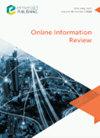Artificial intelligence (AI) for supply chain collaboration: implications on information sharing and trust
IF 3.1
3区 管理学
Q2 COMPUTER SCIENCE, INFORMATION SYSTEMS
引用次数: 0
Abstract
PurposeManagers and scholars alike claim that artificial intelligence (AI) represents a tool to enhance supply chain collaborations; however, existing research is limited in providing frameworks that categorise to what extent companies can apply AI capabilities and support existing collaborations. In response, this paper clarifies the various implications of AI applications on supply chain collaborations, focusing on the core elements of information sharing and trust. A five-stage AI collaboration framework for supply chains is presented, supporting managers to classify the supply chain collaboration stage in a company’s AI journey.Design/methodology/approachUsing existing literature on AI technology and collaboration and its effects of information sharing and trust, we present two frameworks to clarify (a) the interrelationships between information sharing, trust and AI capabilities and (b) develop a model illustrating five AI application stages how AI can be used for supply chain collaborations.FindingsWe identify various levels of interdependency between trust and AI capabilities and subsequently divide AI collaboration into five stages, namely complementary AI applications, augmentative AI applications, collaborative AI applications, autonomous AI applications and AI applications replacing existing systems.Originality/valueSimilar to the five stages of autonomous driving, the categorisation of AI collaboration along the supply chain into five consecutive stages provides insight into collaborations practices and represents a practical management tool to better understand the utilisation of AI capabilities in a supply chain environment.人工智能(AI)促进供应链协作:对信息共享和信任的影响
目的管理者和学者都声称,人工智能(AI)是加强供应链合作的一种工具;然而,现有研究在提供分类框架以确定公司在多大程度上可以应用人工智能能力并支持现有合作方面却很有限。为此,本文澄清了人工智能应用对供应链合作的各种影响,重点关注信息共享和信任这两个核心要素。设计/方法/方法利用现有关于人工智能技术与协作及其对信息共享和信任的影响的文献,我们提出了两个框架,以阐明(a)信息共享、信任和人工智能能力之间的相互关系,以及(b)开发一个模型,说明人工智能如何用于供应链协作的五个人工智能应用阶段。研究结果我们确定了信任与人工智能能力之间不同程度的相互依存关系,并随后将人工智能协作分为五个阶段,即互补型人工智能应用、增强型人工智能应用、协作型人工智能应用、自主型人工智能应用和取代现有系统的人工智能应用。 原创性/价值与自主驾驶的五个阶段类似,将供应链上的人工智能协作分为五个连续的阶段,有助于深入了解协作实践,是更好地理解在供应链环境中利用人工智能能力的实用管理工具。
本文章由计算机程序翻译,如有差异,请以英文原文为准。
求助全文
约1分钟内获得全文
求助全文
来源期刊

Online Information Review
工程技术-计算机:信息系统
CiteScore
6.90
自引率
16.10%
发文量
67
审稿时长
6 months
期刊介绍:
The journal provides a multi-disciplinary forum for scholars from a range of fields, including information studies/iSchools, data studies, internet studies, media and communication studies and information systems.
Publishes research on the social, political and ethical aspects of emergent digital information practices and platforms, and welcomes submissions that draw upon critical and socio-technical perspectives in order to address these developments.
Welcomes empirical, conceptual and methodological contributions on any topics relevant to the broad field of digital information and communication, however we are particularly interested in receiving submissions that address emerging issues around the below topics.
Coverage includes (but is not limited to):
•Online communities, social networking and social media, including online political communication; crowdsourcing; positive computing and wellbeing.
•The social drivers and implications of emerging data practices, including open data; big data; data journeys and flows; and research data management.
•Digital transformations including organisations’ use of information technologies (e.g. Internet of Things and digitisation of user experience) to improve economic and social welfare, health and wellbeing, and protect the environment.
•Developments in digital scholarship and the production and use of scholarly content.
•Online and digital research methods, including their ethical aspects.
 求助内容:
求助内容: 应助结果提醒方式:
应助结果提醒方式:


